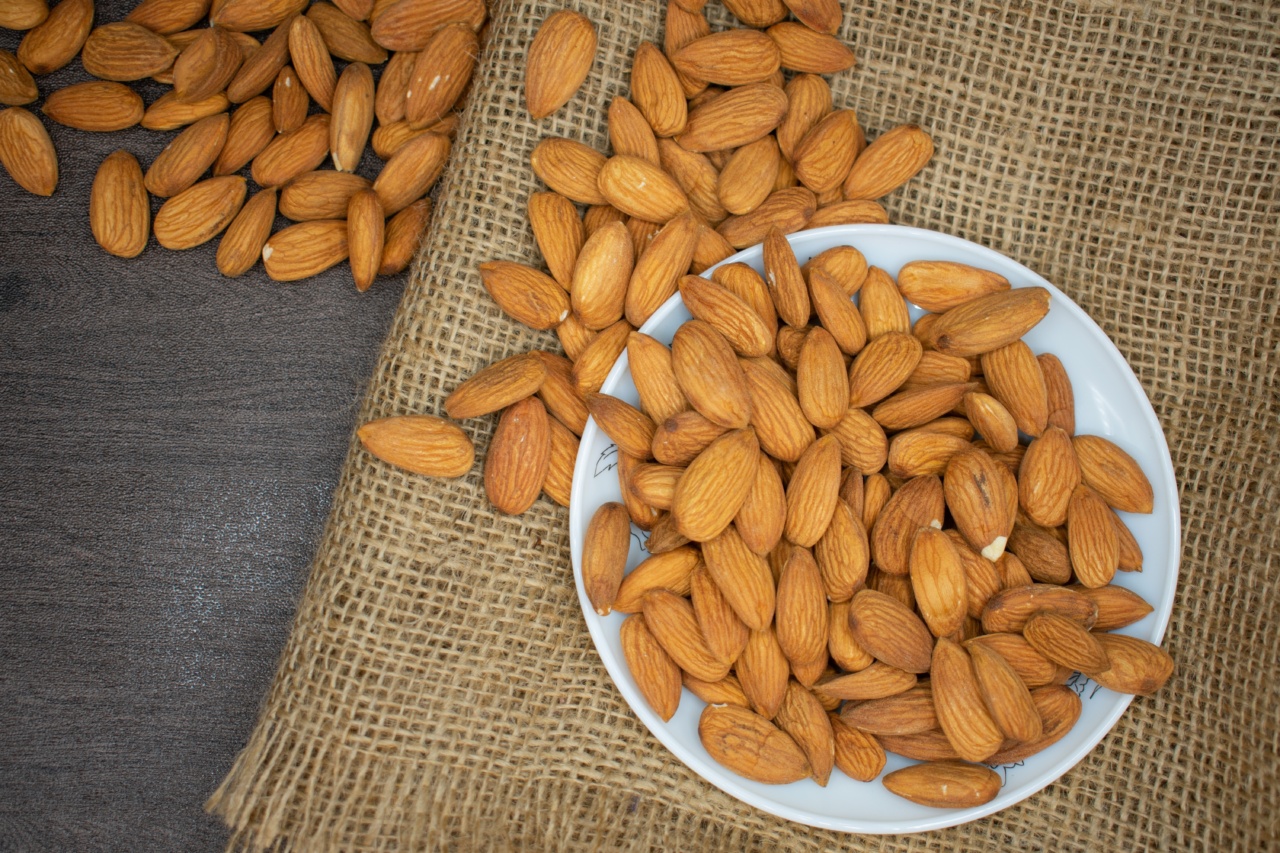Nuts are known for their innumerable health benefits, and one such benefit is their ability to help control uric acid levels in the body.
Uric acid is a waste product that is produced when the body breaks down purines, substances found in certain foods and drinks. When the body is unable to effectively remove uric acid, it can accumulate and crystallize in the joints, leading to a painful condition known as gout.
Why are nuts beneficial for uric acid control?
While purine-rich foods are often recommended to be avoided or consumed in moderation for individuals with gout, nuts are an exception. Nuts have several properties that make them beneficial for those seeking to manage their uric acid levels:.
1. High in heart-healthy fats
Nuts are abundant in monounsaturated and polyunsaturated fats, both of which are considered heart-healthy fats. These fats can help reduce LDL cholesterol levels and improve heart health.
By incorporating nuts into your diet, you can still enjoy a vast array of nutrients without negatively impacting your uric acid levels.
2. Rich in plant-based protein
Protein derived from vegetable sources, such as nuts, can be a great addition to a gout-friendly diet. Unlike animal-based protein sources, plant-based proteins have been shown to have a lower likelihood of raising uric acid levels.
Nuts can provide a substantial protein boost without the purine content found in many animal products.
3. Low in purines
Most nuts have low purine content, which is favorable for individuals with gout.
Purine-rich foods can contribute to increased uric acid production, so opting for nuts as a snack or ingredient in your meals can be an excellent choice for uric acid control.
4. Abundant in antioxidants
Antioxidants play a vital role in reducing inflammation in the body. Chronic inflammation can worsen gout symptoms and increase uric acid levels.
Nuts, especially walnuts and pecans, are rich in antioxidants like polyphenols and flavonoids, which help combat inflammation and prevent oxidative stress.
5. Good source of fiber
Nuts are an excellent source of dietary fiber, which can aid in maintaining optimal digestion and gut health. Fiber also helps regulate blood sugar levels and contributes to satiety, preventing overeating.
By incorporating nuts into your diet regularly, you can support overall health and promote uric acid control.
Best nuts for uric acid control
While all nuts can offer some benefits in terms of uric acid control, here are 30 nutritious nuts that you can include in your diet:.
1. Almonds
Almonds are a versatile nut packed with essential nutrients like vitamin E, magnesium, and healthy fats. They are a great option for snacking or adding to both sweet and savory dishes.
2. Walnuts
Walnuts are a powerhouse of omega-3 fatty acids, antioxidants, and plant-based protein. Their unique flavor and texture make them a popular addition to salads, baked goods, and trail mixes.
3. Pistachios
Pistachios are not only delicious but also an excellent source of protein, fiber, and vitamins. These green-colored nuts make a tasty and healthy snack.
4. Cashews
Cashews are rich in minerals like copper, zinc, and magnesium. They have a buttery taste and can be enjoyed on their own or added to stir-fries and curries.
5. Brazil nuts
Brazil nuts are known for their high selenium content, which is crucial for antioxidant function and thyroid health. Snack on a few Brazil nuts a day to enjoy their benefits.
6. Pecans
Pecans are a rich source of monounsaturated fats and provide a smooth, buttery flavor. They can be used in both sweet and savory dishes or even enjoyed as a quick snack.
7. Macadamia nuts
Macadamia nuts are known for their high fat content but are primarily composed of monounsaturated fats. They add a delightful crunch to cookies, granola, and various dishes.
8. Hazelnuts
Hazelnuts are a delicious and nutritious nut that is abundant in vitamin E, healthy fats, and antioxidants. They can be enjoyed roasted, ground into spreads, or incorporated into desserts.
9. Pine nuts
Pine nuts are often used in Mediterranean cuisine and are a rich source of essential fatty acids, vitamins, and minerals. Their mild, nutty flavor works well in pesto, salads, and pasta dishes.
10. Peanuts
Despite their name, peanuts are legumes and not actual nuts. They are rich in protein, healthy fats, and various nutrients. Opt for unsalted peanuts to reap their potential benefits.
11. Chestnuts
Chestnuts have a unique texture and flavor and are often roasted during colder months. They are low in fat and calories, making them a guilt-free nut option.
12. Sunflower seeds
Although technically not classified as nuts, sunflower seeds are often included in nut mixes and offer similar health benefits. They are high in vitamin E, healthy fats, and plant-based protein.
13. Flaxseeds
Flaxseeds are a nutritional powerhouse, packed with omega-3 fatty acids, fiber, and lignans. Their nutty flavor makes them a popular addition to smoothies, cereals, and baked goods.
14. Chia seeds
Chia seeds are rich in omega-3 fatty acids, fiber, and various nutrients. They have a gel-like texture when soaked and can be used in puddings, smoothies, or as an egg substitute in vegan baking.
15. Sesame seeds
Sesame seeds are tiny but mighty, offering a good amount of essential minerals and antioxidants. They are commonly used as a seasoning or in the form of tahini, a paste used in many cuisines.
16. Pumpkin seeds
Pumpkin seeds, also known as pepitas, are a rich source of magnesium, zinc, and plant-based protein. They are crunchy and can be enjoyed roasted or added to salads and granola.
17. Hemp seeds
Hemp seeds are highly nutritious and contain all essential amino acids, making them a complete source of plant-based protein. They have a mild, nutty flavor and can be sprinkled over salads, yogurt, or blended into smoothies.
18. Poppy seeds
Poppy seeds are commonly used in baked goods and add a subtle crunch and nutty flavor. They also offer small amounts of essential minerals and healthy fats.
19. Quinoa
While technically not a nut, quinoa deserves a mention for its nutritional value and versatility. It is a complete protein, rich in fiber, and contains several essential minerals.
20. Black walnuts
Black walnuts have a bolder and more intense flavor compared to regular walnuts, making them a unique addition to recipes. They are high in antioxidants and healthy fats.
21. Filberts (Hazelnuts)
Filberts, also known as hazelnuts, are a delicious source of key nutrients like vitamin E, healthy fats, and antioxidants. They can be enjoyed solo or incorporated into various dishes.
22. Beechnuts
Beechnuts are small, nutritious nuts that are packed with vitamins, minerals, and antioxidants. While not widely consumed, they offer a unique flavor and can be used in cooking or enjoyed as a snack.
23. Watermelon seeds
Watermelon seeds are often discarded but are highly nutritious. They are a good source of protein, healthy fats, and essential minerals. Roasted watermelon seeds make for a crunchy and nutritious snack.
24. Apricot kernels
Apricot kernels, although not technically nuts, have a similar appearance and are packed with nutrients. These kernels have been used in traditional medicine for their potential health benefits.
25. Macadamia nuts
Macadamia nuts are rich in healthy fats and provide a creamy and buttery texture. They are a popular choice for snacks, baking, and cooking.
26. Butter walnuts
Butter walnuts, also known as heartnuts, are a type of walnut with a unique shape and taste. These nuts are cultivated for their delicious flavor and high nutritional content.
27. Soy nuts
Soy nuts are made from roasted soybeans and are a great source of protein and fiber. They can be enjoyed on their own or incorporated into recipes as a crunchy and nutritious ingredient.
28. Monk fruit seeds
Monk fruit, also known as luo han guo, is a sweet fruit that contains small seeds. These seeds are edible and offer potential health benefits when consumed.
29. Lotus seeds
Lotus seeds are commonly used in Chinese cuisine and are known for their high nutritional value. They can be eaten raw, roasted, or added to desserts and savory dishes.
30. Mixed nuts
A blend of different nuts, such as almonds, cashews, walnuts, and peanuts, can provide a diverse range of nutrients while keeping purine levels low. Invest in a good mix of nuts to enjoy various flavors and health benefits.
Conclusion
Nuts not only make for a delicious and satisfying snack but also offer numerous health benefits, including their ability to help control uric acid levels.
By incorporating a variety of nuts into your diet, you can enjoy their heart-healthy fats, plant-based proteins, and antioxidant properties to support uric acid control and overall well-being.




























